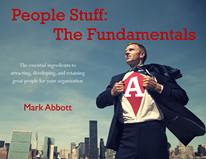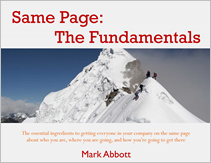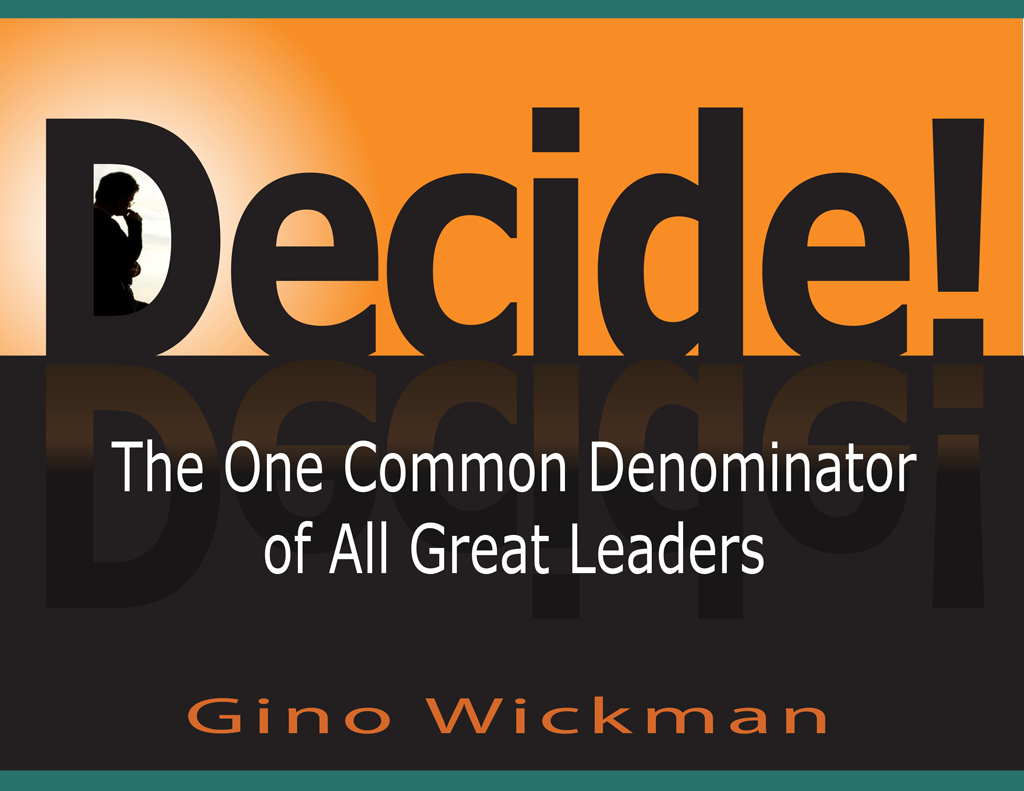“No amount of money will induce someone to lay down their life, but they will gladly do so for a bit of yellow ribbon.”
— Napoléon Bonaparte
As you may recall, in last week’s post, we talked about the importance of getting everyone on the senior leadership team on the Same Page with regard to the answers to Eight Key Questions. In today’s blog, we are going to focus on asking “What is your organization’s Purpose, Passion, or Cause[1]?” In other words, what is your “Why?” I hope to demonstrate the ways in which a clear, compelling Why serves as an extraordinary cornerstone for every focused, energized, and enduring organization. The answers to all other questions follow in the wake of the answer to this one question—in the wake of “Why.”
Why? Because one of the big lessons coming out of studies of successful companies is that, statistically speaking, flourishing and /or enduring businesses (e.g., the exemplar companies featured in Jim Collins’ Built to Last) have a clear reason for being. This purpose, cause, or passion creates powerful loyalties in employees, customers, vendors, and alliance partners, as well as a plethora of benefits including:
- A much better-defined and clearer brand: Apple versus Dell, Harley versus Kawasaki, Costco versus Sam’s Club, Google versus Yahoo, Southwest versus American or Delta or Continental or…
- Pricing power: Apple charges 25% more for basically the same products and virtually never resorts to discounts or promotions to retain customers
- Lower employee turnover: studies show close to one third lower versus peer groups
- Lower customer turnover: (“no one ever gets fired for hiring IBM”)
- Free publicity: Harley Davidson owners sporting Harley Tattoos
Each of these benefits enhances profitability and an organization’s ability to reinvest in products or services that are consistent with their Why. This in turn leads to much higher stock returns, as discussed in this series’ first post.
So what is so powerful about Why?
As business people, we tend to think most decisions are rational and ultimately all about money, but, like Napoléon’s little yellow ribbon, we also know of so many examples where it’s more complicated than that. We get that if all decisions were purely rational, there wouldn’t be one tenth of the start-ups we see, no one would have ever gone to the moon, or climbed Mount Everest, or taken a submarine to the bottom of the ocean, or sailed around the world, or jumped out of a balloon from 128,000 feet above earth. No, it’s more complicated than that. (In fact, if you haven’t seen Daniel Pink’s wonderful video on motivation and purpose, I strongly encourage you to watch it by clicking on a link at the end of this blog.)
So what compels us to join a firm or buy a product when there are readily available alternatives? According to Simon Sinek’s thought-provoking book Start with Why, there are only two ways to influence human behavior: we can manipulate it (through price, promotion, fear, peer pressure, etc.) or we can inspire it (there is also a link to Sinek’s “Start with Why” Ted Talk at the end of the blog). Consequently, a strong Why inspires and unites all of our stakeholders.
A strong Why gives meaning to our work (and customers take note and flock to our brand).
A strong Why appeals to our collective values and our beliefs. It makes us feel like we belong. A strong Why makes us feel like we are part of something special and thus special in our own right. It appeals to both our hearts and our minds. We all get this to some extent. Apple fanatics are some of our best examples (below, please find a link to a short, funny, slightly off-color parody on Apple fanatics) but we see this idea illustrated with lots of other companies like Harley, Google and Southwest Airlines.
A strong Why not only inspires, and gives meaning, it provides clarity. Specifically, don’t most people want to understand “why” they are being asked to do something so they can grasp the implications and answer other key questions like what, when, who, how and where? And, generally speaking, don’t we want our people to provide suggestions on how we could do things better? Wouldn’t it be difficult to ask for such suggestions without giving a sense of why they are being asked for?
A strong Why enhances discipline. It provides guide posts that help us avoid chasing shiny objects, being reactive, pursuing vanity projects, or becoming overly dependent upon a product or service.
A strong Why helps us build a consistent and authentic brand. It helps ensure that everything we do—the type of products or services we sell, the marketing messages we create, the people we hire, the customers we pursue—is consistent with our Why.
A strong Why helps us hold one another accountable so we are better able to not only “walk the talk” but also avoid trying to be all things to all people and end up standing for nothing.
A strong Why helps us articulate the emotional context for decisions that otherwise may have been made more on a gut instinct or not made at all.
A strong Why helps us attract and retain the right people by providing guidance for what types of personal characteristics are conducive to fulfilling our Why and what types of personal characteristics are antithetical to our Why. It helps us find kindred spirits who are attracted to our purpose and passion, giving us a sense of community and a strong culture.
A strong Why binds us together when times are tough and reminds us of why our journey is far from over when things are going well so we don’t become complacent or arrogant.
A strong Why reminds us that our mission is bigger than any one of us.
A strong Why minimizes the egos, the petty, and the parochial as the members have a clear reason for why it is important to leave the company better than they found it.
A strong Why reminds our leaders that this isn’t their company/organization; they are temporary stewards of something exceptional and on loan to them from future generations.
A strong Why dramatically elevates stakeholder trust. When they have a clear sense for our Why and see that we adhere to its pursuit with discipline and consistency they know that no one is “above the law.”
So how do we find and articulate our Why if we don’t already have one? We need to create one with the following in mind.
Rule #1: First, as Patrick Lencioni wrote in his book The Advantage: “Leaders must accept the notion that every organization must contribute in some way to a better world for some group of people, because if it doesn’t, it will, and should, go out of business.”
Rule #2: Most founders have a compelling reason for starting a company. If possible, look to that reason.
Rule #3: Know that anything short of an authentic Why will breed cynicism and contempt for the senior leadership team. Don’t take the exercise lightly, or worse, come up with anything jargon-y, empty or down right bogus.
Rule #4: Don’t expect employees to get out of bed every morning with a sense of enthusiasm and purpose if the organization doesn’t have the same sense at its core.
Rule #5: Be prepared to stick with the answer for as long as the organization exists.
Finally, to get your creativity flowing, the following is a list of the most used Why categories along with some decent examples:
- Customer:
- Southwest Airlines (to champion the common man)
- Amazon (to be earth’s most customer-centric company; to build a place where people can come to find and discover anything they might want to buy online)
- Starbucks (to inspire and nurture the human spirit – one person, one cup, and one neighborhood at a time)
- Industry:
- Boeing (to eat, breathe, and sleep the world of aeronautics)
- LMVH (to provide the world with luxury products, elegance, creativity and “Art de Vivre”)
- Chick-fil-A (to be America’s best quick-service restaurant)
- Greater Cause:
- Disney (to make people happy)
- Merck (to preserve and improve human life)
- Google (to organize the world’s information and make it universally accessible and useful)
- Johnson & Johnson (to alleviate pain and disease)
- Community:
- Facebook (to give people the power to share and make the world more open and connected)
- Nike (to bring inspiration and innovation to every athlete in the world)
- eBay (to provide a global online marketplace where practically anyone can trade practically anything, enabling economic opportunity around the world)
- Employees:
- Marriott (to make people our #1 priority: treat them well, expect a lot, and the rest will follow)
- Innovation:
- 3M (to innovate: thou shall not kill a new product idea)
In our opinion, a company’s Why and its Core Values are the only two things that should never change. Everything else can and should evolve over time.
Finally, to state the obvious, while most great companies begin life with a compelling Why, many do not. That’s okay, but hopefully this blog has made a strong case for why you should schedule time to articulate your Why now.
Until our next blog, be well.
P.S. For the very observant of you, you will note we have changed the title of this series from Smart + Healthy = Enduring Success to Smart x Healthy = Enduring Success since being healthy not only makes it easier to take advantage of being smart, it also has a multiplier effect on productivity.
Click here for Daniel Pink’s The Surprising Truth about What Motivates Us video
Click here to check out Simon Sinek’s “Start with Why” Ted Talk
Click here for a short, funny, slightly off-color, parody on Apple fanatics




